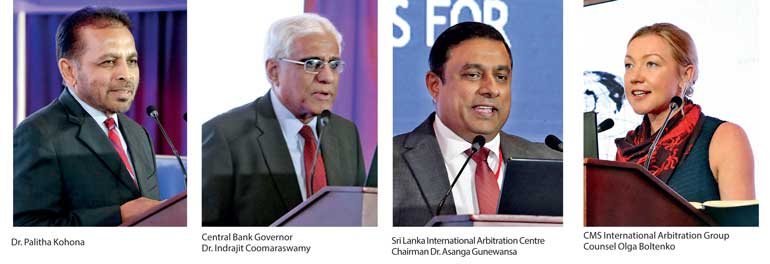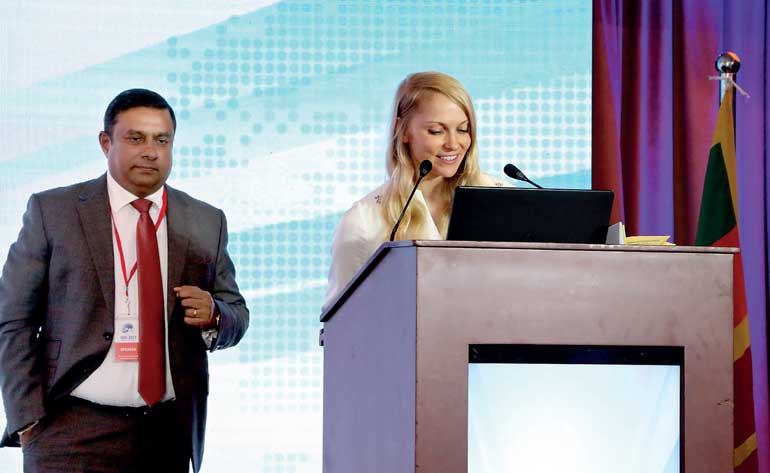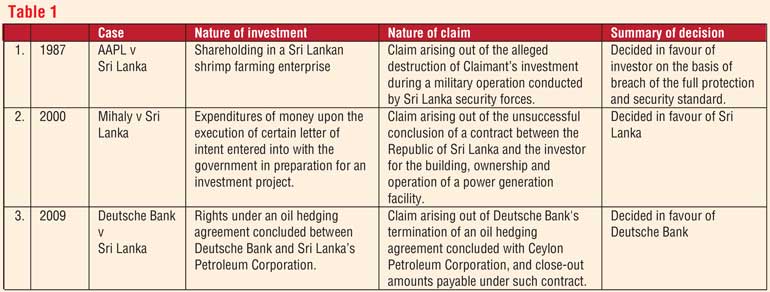Friday Feb 27, 2026
Friday Feb 27, 2026
Wednesday, 20 December 2017 00:00 - - {{hitsCtrl.values.hits}}


 By Tanya Goonewardene
By Tanya Goonewardene
The Sri Lanka Economic and Investment Conclave (SEIC 2017), brainchild of Dr. Palitha Kohona, reached its finale to the rave review of participants, speakers, investors both local and international alike.
Many views were shared on diverse topics starting with a welcome address by Dr. Kohona, former Permanent Representative of Sri Lanka to the United Nations and opening remarks by Dr. Indrajit Coomaraswamy – Governor of the Central Bank of Sri Lanka both who spoke unanimously of Sri Lanka being at the cusp of the preferred investment haven.
An interesting perspective was however offered by Olga Boltenko who addressed the audience on the topic ‘Protection of Foreign Investment: Sri Lanka’s Great Game’. With the opening reference to Peter Hopkirk’s novel ‘The Great Game: On Secret Service in High Asia,’ Boltenko set out Sri Lanka’s growing network of bilateral investment treaties and free trade agreements that allow protection of foreign investment against expropriation, nationalisation, and other instances of undue interference with foreign investment.
The mission of investment treaties and free trade agreements which typically contain investment chapters, as she aptly explained, is to promote and facilitate foreign investment by reducing sovereign risk, raising investors’ confidence, and thus making it easier for risk-averse investors to decide whether to invest in potentially politically unstable jurisdictions.
Investment treaties offer a range of substantive protections to foreign investors, e.g., guarantees of fair and equitable treatment, full protection and security, protection against expropriation and adverse regulation, and a number of other substantive protections that Sri Lanka has introduced in its over 20 investment treaties.
Be that as it may, the highlight of her presentation was the importance of securing the right to international arbitration – which she identified as being the “teeth” of investment treaties. Investor-State dispute resolution – the core of the right to international arbitration - allows foreign investors to bring their grievances with local governments out of domestic courts and before international investment tribunals. This right to international investment arbitration is what makes it worthwhile for Sri Lanka to continue expanding its treaty programme in an effort to attract sustainable and responsible foreign investment.
Boltenko, being a counsel attached to CMS International Arbitration Group and a specialist in investment arbitration, is listed as arbitrator on the Hong Kong International Arbitration Centre (HKIAC) spoke with a lot of passion and conviction on the subject. Boltenko is also listed as an arbitrator in China International Economic and Trade Arbitration Commission (CIETAC) list of arbitrators and on the Kuala Lumpur Regional Centre for Arbitration (KLRCA) panel of arbitrators.
Boltenko, along with Dr. Nicolas Wiegand, are running investment protection and dispute resolution practice at CMS Hong Kong. Together with their colleague in Hong Kong and throughout the CMS network, Boltenko and Dr. Wiegand represented both foreign investors and states in numerous investment arbitration proceedings.
CMS being one of the world’s largest international law firms is one of the very few international law firms with a dedicated Sri Lankan desk. It was indeed a proud moment to learn that the CMS’s Sri Lankan desk is spearheaded by Singapore-based partner Lakshanthi Fernando, who was also present at the Conclave.
It was exhilarating to hear Fernando, who perceived Sri Lanka as a rapidly growing arbitration market, state that she sees Colombo having a strong potential to claim its rightful place as a regional dispute resolution hub among leading Asian arbitral centres.
Boltenko, addressing the Chinese investors in attendance at the Conclave, emphasised that China has signed and ratified over 120 investment treaties, including with most OBOR jurisdictions, and over 20 multilateral investment treaties with in-built ISDS mechanisms. She once again set out the most important substantive protections that are available to Chinese investors under these treaties, and in particular to those Chinese investors who invest in Sri Lanka under the China-Sri Lanka Bilateral Investment Treaty:
1.Protection against expropriation: “Neither Contracting Party shall take any measure of expropriation, nationalisation or other measures having effect equivalent to expropriation or nationalisation against the investment of nationals or companies of the other contracting party.” (Art. 6 Sri Lanka – China BIT)
2.Guarantee of full protection and security and fair and equitable treatment: “Investments shall be accorded fair and equitable treatment and protection” (Art. 3 of Sri Lanka – China BIT)
3.Most favoured nation treatment: Neither Contracting Party shall in its territory subject investments to treatment less favourable than that which it accords to investments of any third state” (Art. 4 of the BIT)
The “teeth” of BIT – investment arbitration – Sri Lanka’s investment arbitration dashboard
As accurately noted by Boltenko, Sri Lanka is not new to investment arbitration, The Sri Lankan government was involved in three hallmark treaty cases decided under the auspices of the World Bank (ICSID), including in the first ever treaty dispute in the history of arbitration under bilateral investment treaties – AAPL v Sri Lanka.
Boltenko further made observations pertaining Sri Lanka’s participation in investment treaty proceedings, its treaty programme, and informed the delegates of the development of international investment protection law to a great extent.
The speaker expressed her views on the latest treaty case involving Sri Lanka as respondent State that is currently ongoing, which is a claim brought by a UK investor against Sri Lanka under the UK-Sri Lanka bilateral investment treaty. The dispute in that case, as she noted, arose over the Government reacquiring land plot not long after being granted to the UK investor for the development of a hotel, on the grounds of requiring it for a public purpose in order to carry out a flood prevention programme for Parliament and the surrounding areas.
In her presentation, Boltenko then listed three other treaty cases involving Sri Lanka, the summary of which is encapsulated in the table.
As an international arbitrator in the interest if striking a happy equilibrium, the following suggestions were offered by Boltenko to foreign investors to ensure that their investment benefit from the protection of international law in cases of undue government interference.
She alluded to the importance of structuring investments so as to benefit from the international investment treaty protection and making investments in accordance with local legislation so as to not face the repercussions of contravention, far more expensive than the due diligence required to carry out an investigation along with well informed and professionally savvy individuals in the best interest of the investor. She then addressed the elephant in the room and prudently advised all investors on the importance of obtaining political risk insurance to mitigate any risks of investment being compromised by a changing political landscape and other government measures.
As a further step towards certainty she advised all investors to document every conceivable potential expropriatory measure and preserve evidence of investment. Additionally, notice of dispute and cooling-off periods, state agreements, settlement, conciliation and provisions relating to arbitration were regarded as being of paramount importance in securing foreign investment.
She emphasised on the importance of the need for awareness of the Government’s exposure to international arbitration with respect to Government measures that affect foreign investment whist emphasising the need for immediate attention to requests and notices of dispute warning that with such efficiencies exposure can be prevented at early stages.
She finally spoke of the protection of the Government’s right to regulate matters of public concern within its territory while championing any efforts of the Government treaty-making practices and participation in the current debate on reforming investor-state dispute resolution mechanism at the UNCITRAL Working Group III meetings.
In order to get a perspective on the state of arbitration in Sri Lanka, I was able to have a brief audience with Dr. Asanga Gunewansa who was a notable speaker/panellist of the Conference and also the Chairman of the recently-established Sri Lanka International Arbitration Centre. He is listed as an arbitrator and a mediator on the Kuala Lumpur Regional Centre for Arbitration (KLRCA) panel of arbitrators and mediators.
Being an authority on the subject of arbitration, when inquired for his take on the subject at hand, he said: “Sri Lanka is poised to be the preferred destination for all arbitrations in the region for multiple reasons. It is not only geographically advantaged but is primarily more cost effective than other hubs in Asia such as Singapore, Hong Kong and Kuala Lumpur. It would not be difficult for Sri Lanka to develop as the preferred arbitration hub in South Asia as parties from India, Pakistan, Bangladesh and Maldives have already shown a keen interest in treating Sri Lanka as the preferred hub for arbitration. The Government of Sri Lanka has taken the initiative to establish a state-of-the-art arbitration facility at the World Trade Centre. We are now waiting for seed money or financial assistance from the Government to get the place up and running. I am confident that we possess the required skills and expertise to become a hub of excellence in this field of alternate dispute resolution.”
Dr. Gunawansa also pointed out that Sri Lanka was one of the first countries in Asia to adopt the UNCITRAL Model Law on Arbitration and that Sri Lanka is also a party to the Convention on the Recognition and Enforcement of Foreign Arbitral Awards, popularly known as the New York Convention. He expressed the view that Sri Lanka has several senior lawyers who are highly knowledgeable and skilled in Arbitration and that the Sri Lankan Commercial High Court and the Supreme Court have judges who appreciate and understand the importance of arbitration and other forms of alternative dispute resolution.
Dr. Gunewansa is an Attorney-at- Law who is heading the Colombo Law Alliance, a law chamber specialising in investment law, construction law and commercial law. Dr. Gunawansa holds a PhD in Law from the National University of Singapore (NUS) and an LL.M in International Economic Law from the University of Warwick. He was a Professor at NUS, Singapore from 2007-2013 and prior to that was attached to the United Nations Relief and Works Agency (UNRWA) and the United Nations Compensation Commission (UNCC) as a Legal Officer. He is also an Advisor to the Green Climate Fund in Songdo, Korea and a consultant to the ADB on Public-Private Partnerships.
After her presentation, I met Boltenko who made the observation that she was the only female panellist or speaker at the conference. The subject led us to discussing the noticeable dearth of female participation in similar forums in a world where we both considered the concept of a glass ceiling to be a thing of the past.
The amiable Boltenko was free to encourage any young professional who sought a career in non-adversarial alternate dispute resolution to consider arbitration as a stable career and a gateway to acquiring an international, multi-jurisdictional skill. She further added that it is her personal aspiration to see more female counsel venture in to the field of arbitration and was full of praise of the equity it had to offer any professional who made it their calling.
(The author is an Attorney-at-Law and holds a Diploma in Law and Bachelor of Laws awarded by the University of London, UK.)